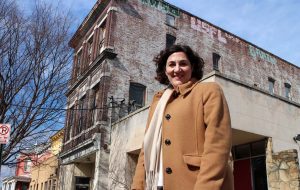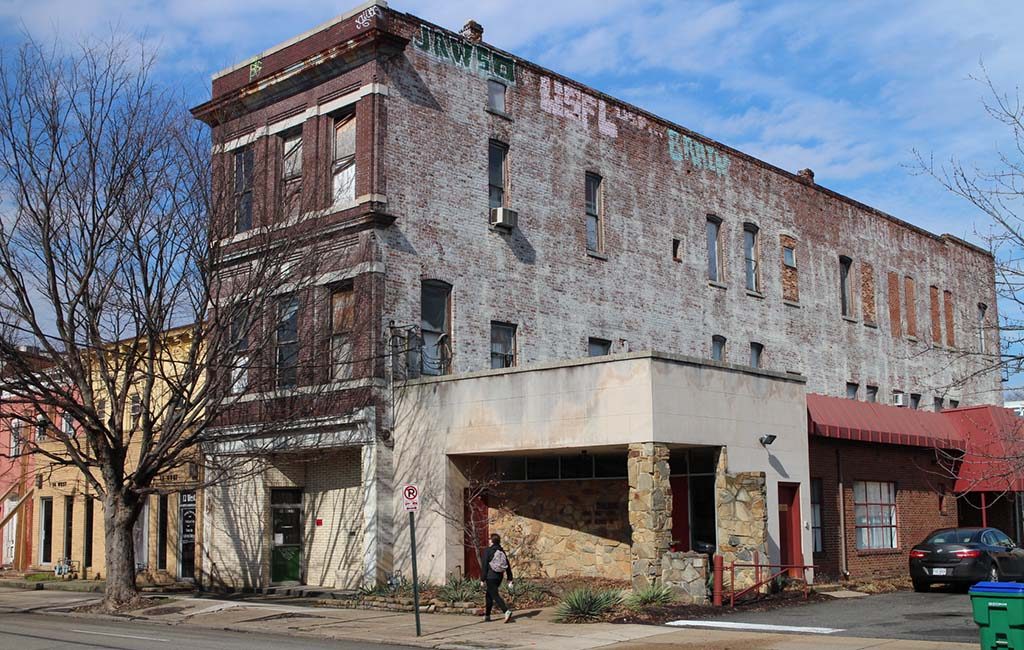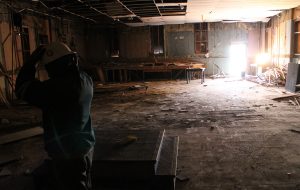An apartment rehab in Jackson Ward is breathing new life into a century-old building.
Local developer Lizzie Drucker plans to convert the three-story, 15,000-square-foot building at 10 W. Leigh St. into 15 or more one-bedroom apartments. She described the project as a scaling-up of her previous work restoring houses.
“That’s what I went into Jackson Ward looking for,” Drucker said. “My friend Ron Stallings was like, ‘No, I want to show you the building that you need to buy.’”
Stallings, a Jackson Ward developer whose projects include the restoration of the Hippodrome Theater, pointed out the building to Drucker, who said she fell in love with its architectural details and history.
“I could see exactly what he saw in it,” she said. “And as we’re demoing, we’re uncovering tin ceilings that have beautiful ornate work on them and wainscoting that has been covered over with paneling. I’m trying to keep those architectural elements there so that we can work off of those for the final product.”
Built in 1911, the building once served as a Masonic lodge, evident by a second-floor dance hall and adjoining kitchen and a top-floor room that appears to have been ceremonial. Drucker said her research at the Library of Virginia showed a storefront on the ground floor facing the street.
Drucker said she’s planning 15 to 18 units ranging in size from 500 to 800 square feet. She’ll need a special-use permit from the City of Richmond, as the building’s current multifamily zoning would only allow for four apartments, Drucker said.
The project will also require approvals through the Virginia Department of Historic Resources. Drucker said she has a preliminary meeting with DHR scheduled and is planning a presentation in March to the Historic Jackson Ward Association.
Drucker said apartment designs will depend on those approvals, which would determine pricing and other details. She’s planning to include storage spaces, a fitness room and other amenities.
“We’re hoping to make a higher-end product,” she said. “I think that area can definitely support it at this point.”
Drucker is working with a group of investors that purchased the 0.12-acre property in December for $505,000, according to city records. The purchase was made through 10 West Leigh St LLC.
She said the project would cost between $1.2 million and $1.5 million – “if we can keep on budget.” She’s working with Richmond firm Corinthian Construction and architect Bruce Shirley of Ratio PC.
Drucker said the building has been dormant since at least the 1980s. In addition to rehabbing the interior, she hopes to restore the building’s façade, which she said was altered over the years.

Lizzie Drucker outside the Jackson Ward building she plans to rehab as apartments. (Jonathan Spiers)
“I don’t know what they were thinking with the blonde brick on the front of it,” she said. “Hopefully we’ll be able to get rid of that and create an impressive entrance.”
In addition to the tin ceilings and other salvageable details, interior demolition has uncovered some artifacts from the past, including a sales board used when the ground-floor space was an insurance office, and a poster advertising a dance in the building at what was then called the “Lucky 13” club.
Drucker said her goal is to finish the rehab by the end of this year, depending on the permitting process, which she said could last several months. She said she’s also eyeing a nearby vacant lot at Leigh and St. James streets for a possible retail project.
“We love Jackson Ward, and I can’t imagine a better neighborhood to be in,” she said. “You step out onto the sidewalk and you’re just right there in the community. I get why it was such a happening neighborhood at one time, and we hope to bring that back.”
Drucker’s entrepreneurial spirit is shared by her husband, Russell Basch, whose bed and bath linens company, American Pillowcase, ranked No. 2 on BizSense’s RVA 25 list of the area’s fastest-growing companies in 2015.
An apartment rehab in Jackson Ward is breathing new life into a century-old building.
Local developer Lizzie Drucker plans to convert the three-story, 15,000-square-foot building at 10 W. Leigh St. into 15 or more one-bedroom apartments. She described the project as a scaling-up of her previous work restoring houses.
“That’s what I went into Jackson Ward looking for,” Drucker said. “My friend Ron Stallings was like, ‘No, I want to show you the building that you need to buy.’”
Stallings, a Jackson Ward developer whose projects include the restoration of the Hippodrome Theater, pointed out the building to Drucker, who said she fell in love with its architectural details and history.
“I could see exactly what he saw in it,” she said. “And as we’re demoing, we’re uncovering tin ceilings that have beautiful ornate work on them and wainscoting that has been covered over with paneling. I’m trying to keep those architectural elements there so that we can work off of those for the final product.”
Built in 1911, the building once served as a Masonic lodge, evident by a second-floor dance hall and adjoining kitchen and a top-floor room that appears to have been ceremonial. Drucker said her research at the Library of Virginia showed a storefront on the ground floor facing the street.
Drucker said she’s planning 15 to 18 units ranging in size from 500 to 800 square feet. She’ll need a special-use permit from the City of Richmond, as the building’s current multifamily zoning would only allow for four apartments, Drucker said.
The project will also require approvals through the Virginia Department of Historic Resources. Drucker said she has a preliminary meeting with DHR scheduled and is planning a presentation in March to the Historic Jackson Ward Association.
Drucker said apartment designs will depend on those approvals, which would determine pricing and other details. She’s planning to include storage spaces, a fitness room and other amenities.
“We’re hoping to make a higher-end product,” she said. “I think that area can definitely support it at this point.”
Drucker is working with a group of investors that purchased the 0.12-acre property in December for $505,000, according to city records. The purchase was made through 10 West Leigh St LLC.
She said the project would cost between $1.2 million and $1.5 million – “if we can keep on budget.” She’s working with Richmond firm Corinthian Construction and architect Bruce Shirley of Ratio PC.
Drucker said the building has been dormant since at least the 1980s. In addition to rehabbing the interior, she hopes to restore the building’s façade, which she said was altered over the years.

Lizzie Drucker outside the Jackson Ward building she plans to rehab as apartments. (Jonathan Spiers)
“I don’t know what they were thinking with the blonde brick on the front of it,” she said. “Hopefully we’ll be able to get rid of that and create an impressive entrance.”
In addition to the tin ceilings and other salvageable details, interior demolition has uncovered some artifacts from the past, including a sales board used when the ground-floor space was an insurance office, and a poster advertising a dance in the building at what was then called the “Lucky 13” club.
Drucker said her goal is to finish the rehab by the end of this year, depending on the permitting process, which she said could last several months. She said she’s also eyeing a nearby vacant lot at Leigh and St. James streets for a possible retail project.
“We love Jackson Ward, and I can’t imagine a better neighborhood to be in,” she said. “You step out onto the sidewalk and you’re just right there in the community. I get why it was such a happening neighborhood at one time, and we hope to bring that back.”
Drucker’s entrepreneurial spirit is shared by her husband, Russell Basch, whose bed and bath linens company, American Pillowcase, ranked No. 2 on BizSense’s RVA 25 list of the area’s fastest-growing companies in 2015.





Another one bites the dust! Congratulations to Lizzie Drucker for taking down this beautiful old building and converting it into livable taxable space. This is yet another example of a rehab that would have been unaffordable if it weren’t for real estate tax abatements and historic rehab tax credits. Yet from day one of the SUP, the building is earning more revenue for the city than it would have if it had laid dormant plus providing construction jobs during the process. It’s a small job but 80% of the tax credits are used for rehabs of four units or less.… Read more »